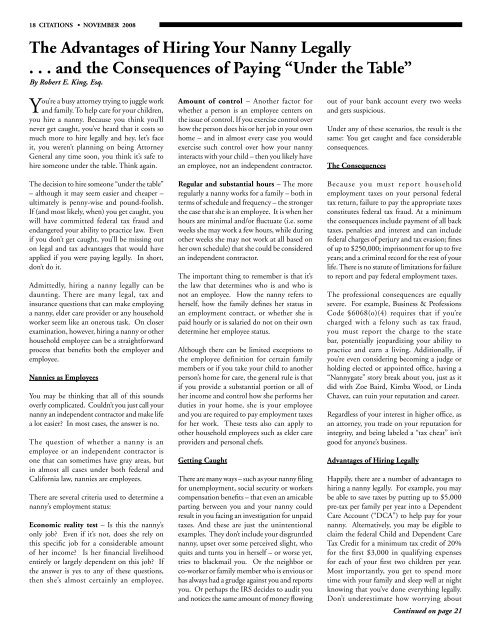Kathleen Johnston Back - Ventura County Bar Association
Kathleen Johnston Back - Ventura County Bar Association
Kathleen Johnston Back - Ventura County Bar Association
You also want an ePaper? Increase the reach of your titles
YUMPU automatically turns print PDFs into web optimized ePapers that Google loves.
18 CITATIONS • NOVEMBER 2008The Advantages of Hiring Your Nanny Legally. . . and the Consequences of Paying “Under the Table”By Robert E. King, Esq.You’re a busy attorney trying to juggle workand family. To help care for your children,you hire a nanny. Because you think you’llnever get caught, you’ve heard that it costs somuch more to hire legally and hey, let’s faceit, you weren’t planning on being AttorneyGeneral any time soon, you think it’s safe tohire someone under the table. Think again.Amount of control – Another factor forwhether a person is an employee centers onthe issue of control. If you exercise control overhow the person does his or her job in your ownhome – and in almost every case you wouldexercise such control over how your nannyinteracts with your child – then you likely havean employee, not an independent contractor.out of your bank account every two weeksand gets suspicious.Under any of these scenarios, the result is thesame: You get caught and face considerableconsequences.The ConsequencesThe decision to hire someone “under the table”– although it may seem easier and cheaper –ultimately is penny-wise and pound-foolish.If (and most likely, when) you get caught, youwill have committed federal tax fraud andendangered your ability to practice law. Evenif you don’t get caught, you’ll be missing outon legal and tax advantages that would haveapplied if you were paying legally. In short,don’t do it.Admittedly, hiring a nanny legally can bedaunting. There are many legal, tax andinsurance questions that can make employinga nanny, elder care provider or any householdworker seem like an onerous task. On closerexamination, however, hiring a nanny or otherhousehold employee can be a straightforwardprocess that benefits both the employer andemployee.Nannies as EmployeesYou may be thinking that all of this soundsoverly complicated. Couldn’t you just call yournanny an independent contractor and make lifea lot easier? In most cases, the answer is no.The question of whether a nanny is anemployee or an independent contractor isone that can sometimes have gray areas, butin almost all cases under both federal andCalifornia law, nannies are employees.There are several criteria used to determine ananny’s employment status:Economic reality test – Is this the nanny’sonly job? Even if it’s not, does she rely onthis specific job for a considerable amountof her income? Is her financial livelihoodentirely or largely dependent on this job? Ifthe answer is yes to any of these questions,then she’s almost certainly an employee.Regular and substantial hours – The moreregularly a nanny works for a family – both interms of schedule and frequency – the strongerthe case that she is an employee. It is when herhours are minimal and/or fluctuate (i.e. someweeks she may work a few hours, while duringother weeks she may not work at all based onher own schedule) that she could be consideredan independent contractor.The important thing to remember is that it’sthe law that determines who is and who isnot an employee. How the nanny refers toherself, how the family defines her status inan employment contract, or whether she ispaid hourly or is salaried do not on their owndetermine her employee status.Although there can be limited exceptions tothe employee definition for certain familymembers or if you take your child to anotherperson’s home for care, the general rule is thatif you provide a substantial portion or all ofher income and control how she performs herduties in your home, she is your employeeand you are required to pay employment taxesfor her work. These tests also can apply toother household employees such as elder careproviders and personal chefs.Getting CaughtThere are many ways – such as your nanny filingfor unemployment, social security or workerscompensation benefits – that even an amicableparting between you and your nanny couldresult in you facing an investigation for unpaidtaxes. And these are just the unintentionalexamples. They don’t include your disgruntlednanny, upset over some perceived slight, whoquits and turns you in herself – or worse yet,tries to blackmail you. Or the neighbor orco-worker or family member who is envious orhas always had a grudge against you and reportsyou. Or perhaps the IRS decides to audit youand notices the same amount of money flowingBecause you must report householdemployment taxes on your personal federaltax return, failure to pay the appropriate taxesconstitutes federal tax fraud. At a minimumthe consequences include payment of all backtaxes, penalties and interest and can includefederal charges of perjury and tax evasion; finesof up to $250,000; imprisonment for up to fiveyears; and a criminal record for the rest of yourlife. There is no statute of limitations for failureto report and pay federal employment taxes.The professional consequences are equallysevere. For example, Business & ProfessionsCode §6068(o)(4) requires that if you’recharged with a felony such as tax fraud,you must report the charge to the statebar, potentially jeopardizing your ability topractice and earn a living. Additionally, ifyou’re even considering becoming a judge orholding elected or appointed office, having a“Nannygate” story break about you, just as itdid with Zoe Baird, Kimba Wood, or LindaChavez, can ruin your reputation and career.Regardless of your interest in higher office, asan attorney, you trade on your reputation forintegrity, and being labeled a “tax cheat” isn’tgood for anyone’s business.Advantages of Hiring LegallyHappily, there are a number of advantages tohiring a nanny legally. For example, you maybe able to save taxes by putting up to $5,000pre-tax per family per year into a DependentCare Account (“DCA”) to help pay for yournanny. Alternatively, you may be eligible toclaim the federal Child and Dependent CareTax Credit for a minimum tax credit of 20%for the first $3,000 in qualifying expensesfor each of your first two children per year.Most importantly, you get to spend moretime with your family and sleep well at nightknowing that you’ve done everything legally.Don’t underestimate how worrying aboutContinued on page 21
















